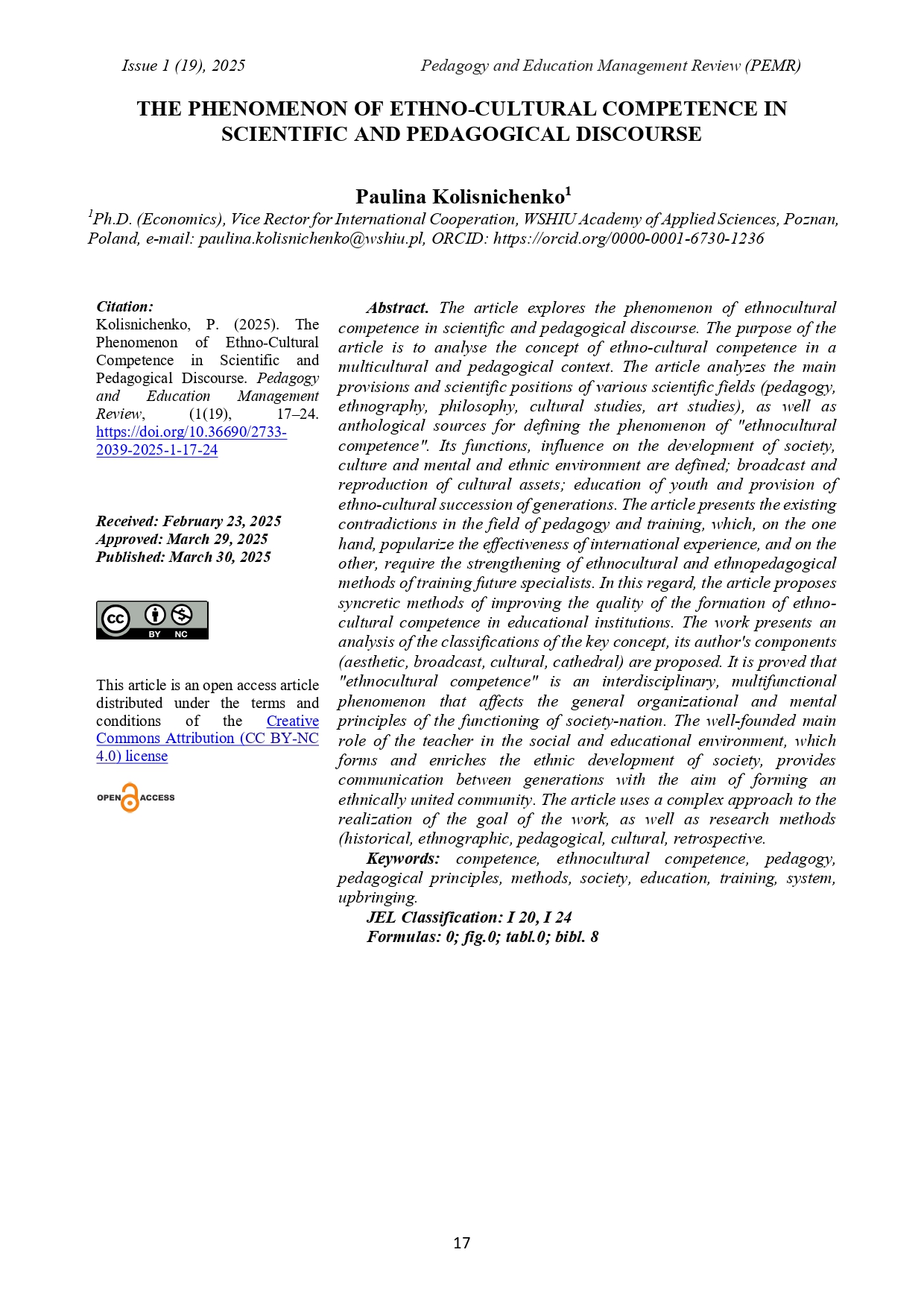THE PHENOMENON OF ETHNO-CULTURAL COMPETENCE IN SCIENTIFIC AND PEDAGOGICAL DISCOURSE
DOI:
https://doi.org/10.36690/2733-2039-2025-1-17-24Keywords:
competence, ethnocultural competence, pedagogy, pedagogical principles, methods, society, education, training, system, upbringingAbstract
The article explores the phenomenon of ethnocultural competence in scientific and pedagogical discourse. The purpose of the article is to analyse the concept of ethno-cultural competence in a multicultural and pedagogical context. The article analyzes the main provisions and scientific positions of various scientific fields (pedagogy, ethnography, philosophy, cultural studies, art studies), as well as anthological sources for defining the phenomenon of "ethnocultural competence". Its functions, influence on the development of society, culture and mental and ethnic environment are defined; broadcast and reproduction of cultural assets; education of youth and provision of ethno-cultural succession of generations. The article presents the existing contradictions in the field of pedagogy and training, which, on the one hand, popularize the effectiveness of international experience, and on the other, require the strengthening of ethnocultural and ethnopedagogical methods of training future specialists. In this regard, the article proposes syncretic methods of improving the quality of the formation of ethno-cultural competence in educational institutions. The work presents an analysis of the classifications of the key concept, its author's components (aesthetic, broadcast, cultural, cathedral) are proposed. It is proved that "ethnocultural competence" is an interdisciplinary, multifunctional phenomenon that affects the general organizational and mental principles of the functioning of society-nation. The well-founded main role of the teacher in the social and educational environment, which forms and enriches the ethnic development of society, provides communication between generations with the aim of forming an ethnically united community. The article uses a complex approach to the realization of the goal of the work, as well as research methods (historical, ethnographic, pedagogical, cultural, retrospective.
Downloads
References
Bykova O. M. (2021). A short dictionary of relevant foreign language words and terms used in the modern educational process. Putivl: PCPP, 11 p.
Gavrilova L.G. (2017). Specificity of developing distance courses in music and history disciplines. Information Technologies and Learning Tools, 58 (2), 26-37.
Honcharenko O. V. (2021). Meloareological vertical of Polissia - Naddniprianshchyna (based on wedding melodies of Sumy region): PhD thesis ... Candidate of Arts: speciality 17.00.03 "Musical Art". Sumy: Sumy State Pedagogical University named after A. Makarenko. Makarenko State Pedagogical University, 20 p.
Goncharenko S. U. (1997). Ukrainian pedagogical dictionary. Golovko]. Kyiv: Lybid, 1997. 373 с.
Karpenko Z. S. (1998). Axiopsychology of personality. Kyiv: International Financial Agency LLC, 512 p.
Kosenko Y. (2008). Ethnopedagogical approach to professional training of future teachers of preschool educational institutions. Herald of the Precarpathian University. Pedagogy, XIX-XX, 67-74.
Subbota O. V. (2001). Features of the motor-tonal nature of music. Musical art and culture. Scientific Bulletin of the Odesa State Conservatory named after A. V. Nezhdanova. 2. 14-151.
Ustymenko-Kosorich O. A. (2013). Serbian accordion school: history and modernity: a monograph. Luhansk: Luhansk Taras Shevchenko National University, 351 p.







